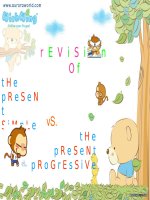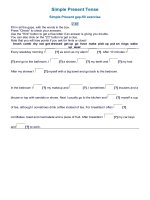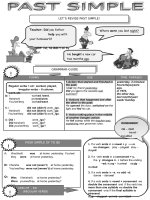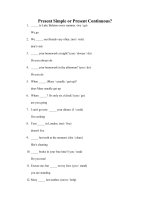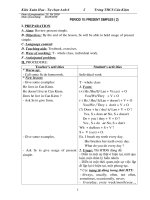The present simple
Bạn đang xem bản rút gọn của tài liệu. Xem và tải ngay bản đầy đủ của tài liệu tại đây (70.98 KB, 6 trang )
Lesson 1: THE PRESENT TENSES
Aim: By the end of the lesson Sts will be able to use correctly the present tenses
A. THE PRESENT SIMPLE TENSE
I. FORM
To Be: is/am/are
1. Positive form
S + be + N/ Adj/ Prep.
Ex: He is a student.
She is beautiful.
They are at home.
2. Negative form
S + be + not + N/ Adj/ Prep.
Ex: She is not beautiful.
3. Interrogative form
Be + S + N/ Adj/ Prep.
Ex: are you a student?
Ordinary verbs
1. Positive form
S + V(s,es) + O
Ex: I go to school every day.
He runs in the evenings.
2. Negative form
S + do/does + not + V (bare) + O
Ex: We do not usually go to school by bus.
She doesn’t often wake up before 7 a.m
3. Interrogative form
Do/does + S + V (bare) + O?
Ex: Do you usually watch TV in the evening?
II. USE
1. Habitual actions in the present
Ex: He walks to school every day.
2. General timeless truths
Ex: The earth goes around the sun.
3. Expresses future (when a event is scheduled)
Ex: The train from HN to HCM city leaves at 20 o’clock.
4. Thought of the speakers at the present
Ex: I like football.
Note: * When S is the third person singular, we put S at the end of ordinary verbs.
- Verbs end with: - o, -sh, -ch, -s, -x, -z + ES
Ex: watch - watches go - goes
- Verbs end with a consonant and Y, change Y into I, then put ES
Ex: carry - carries try - tries
- Verbs end with a vowel and Y, only put S.
Ex: enjoy - enjoys stay - stays
* Some words usually go with verbs in the present simple:
- Adv of frequency: Always, usually, often, sometimes,
- Every + day, month, Sunday, …
- Once a week, twice a month, …
B. THE PRESENT PROGRESSIVE TENSE
I. FORM
1. Positive form
S + BE (is/am/are) + V-ing + (O)
Ex: We are learning English now.
2. Negative form
S + BE (is/am/are) + not + V-ing + (O)
Ex: She is not watching TV at the moment.
3. Interrogative form
BE (is/am/are) + S + V-ing + (O)?
Ex: Is your mother cooking now?
II. USE
1. Action or event in progress
Ex: He is attending a meeting now.
2. Temporary activity.
Ex: I live in Hanoi, but this week I am staying in Hue with some friends.
3. Expresses future (when event is planned and usually with future time adv)
Ex: Mary is coming tomorrow.
4. Emotional comment on present habit (usually co-occurring with Always or Forever)
Ex: This student is always going to class late.
Note:
* Rule to put -ing to verbs:
- Verbs end with -E: eliminate E, then put -ing
Ex: Live - living
- Verbs end with -EE: only put -ing
Ex: agree - agreeing
- Verbs end with -IE: change -IE into -Y, and then put -ing
Ex: lie - lying
- One- syllable - verbs end with a vowel and a consonant (Except -y, -w, -x): Double ending consonant,
then put -ing.
Ex: stop - stopping plan - planning
* Some words usually go with verbs in the present simple: at the moment, at the present, at the present
time, now, right now,…
C. THE PRESENT PERFECT TENSE
I. FORM
1. Positive form
S + HAVE/HAS + P
II
+ (O)
Ex: I have washed my car.
She has bought a new hat.
2. Negative form
S + HAVE/HAS + NOT + P
II
+ (O)
Ex: They have not finished their work.
3. Interrogative form
HAVE/HAS + S + P
II
+ (O)?
Ex: Have you ever been to Hue?
II. USE
1. A situation that began in the past and that continues into the present.
Ex: I have been a teacher since 2004.
2. A past experience with current result:
Ex: They have already seen that movie
3. A very recently completed action:
Ex: She has just seen an old friend in the street.
4. A situation that happened in the past, but not mention the time:
Ex: Mary has been to Vietnam.
* Note: Some words usually go with verbs in the present simple:
- Just = recently = lately, before, already, ever, never, yet, since, for.
- So far = until now, up to now, up to the present.
- It’s ( this is ) the first/the second time + clause
EXERCISES ON THE PRESENT TENSES
I. Choose the best answer:
1. Be quiet! The baby ………………
a. sleeps b. are sleeping c. sleep d. is sleeping.
2. We seldom ……………… before 6:30.
a. eat b. eats c. is eating d. are eating.
3. Look! A man ……………… after the train.
a. runs b. runs c. is running d. are running
4. The sun ……………… in the West.
a. set b. sets c. is setting d. are setting.
5. It ……………… often hot in Summer.
a. is b. are c. is being d. am
6. I ……………… an exercise on the present tenses at this moment .
a. am doing b. do c. are doing d. does.
7. My mother sometimes ……………… vegetables at this market.
a. buy b. buys c. are buying d. is buying
8. It ……………… very cold now.
a. is b. are c. is being d. am
9. It ……………… much in summer. It ……………… now.
a. rain/ is raining b. rains/ are raining c. rains/ is raining d. is raining/ is raining
10. Daisy ……… some food in the kitchen at present. She always …….… in the morning.
a. cook/ is cooking b. cooks/ are cooking c. cooks/ is cooking d. is cooking/cooks
11. How long …………you ………… English? - For 5 years now.
a. has …. studied b. have … studied c. has been … studying d. have … been studying
12. I ……………… for two hours, but she has not come yet.
a. have waited b. has waited c. has been waiting d. waited.
13. They ……………… in Ho Chi Minh City since 1975.
a. lived b. has lived c. have been living d. live.
14. She ……………… all the books written by Dickens for 10 years.
a. have read b. has read c. read d. has been read.
15. He ……………… here since Christmas, I wonder where he has been living since then.
a. hasn’t been b. hasn’t been being c. haven’t been d. haven’t been being.
16. Jack has been going to Paris for a holiday. He never ……………… there.
a. has been b. has been being c. have been d. have been being.
17. ….You ……………… so far? I have rung the bell for the last twenty minutes.
a. has …. slept b. have … been sleeping c. have sleep d. has …. been sleeping
18. He ……………… a novel for two years, but he has not finished it yet.
a. has written b. have been writing c. have written d. has write.
19. Mary has lost her hat and she ……………… for it until now.
a. have been looking b. has look c. has looked d. have looked.
20. I ……………… that film several times because I like it.
a. has seen b. have saw c. has been seeing d. have seen.
21. Listen! I think someone ……………… at the door.
a. are knocking b. has knocked c. is knocking d. have knocked.
22. Up to the present, we ……………… almost every lesson in the book.
a. are writing b. have written c. has written d. is writing
23. The earth ……………… the sun once every 365 days.
a. circle b. circles c. is circling d. are circling
24. The farmers ……………… in the field at the moment.
a. is working b. are working c. have worked d. work
25. How many times … you ………….him since he went to Edinburgh?
a. do … see b. has … seen c. have … seen d. are … seeing
26. Rivers usually ……………… to the sea.
a. flow b. is flowing c. have flown d. has flown.
27. Look! The boy ………………
a. is crying b. are crying c. has cried d. cries.
28. Do you know that man who often ……………… here?
a. smokes b. smoke c. has smoked d. have smoked.
29. Mrs Green always ……………… to work by bus.
a. go b. goes c. has gone d. is going
30. We are from French. We ……………… there for 20 years.
a. has been b. are c. have been d. are being
31. That house ……………… to Mr. Green.
a. belong b. belongs c. have belonged d. are belonging
32. Mai ……………… her dictionary lately.
a. lose b. loses c. have lost d. has lost.
33.I am sorry. I ……………… that girl's name already.
a. forget b. forgets c. has forgotten d. have forgotten
34. I ……………… for the manager for two hours.
a. am waiting b. wait c. has waited d. have waited
35. ……you ………. a lion?
a. Have ….ever seen b. has … ever seen c. do … ever see d. are ever seeing
II. Put the verb in brackets into the correct tense:
1. Until yesterday I (never/ hear) …………………. about it.
2. Sam (already /leave) ……………… ……when we (get) ………………………….there
3 How long …………(you/ study) ………………………….English?
- I (learn) ……………….………. English since I was twelve
4. Who is that woman? I (never/ see) ………………… her before
5. He usually ………… (drink) coffee, but today he …….……. (drink) tea.
6. I’m busy at the moment. I …… (decorate) the sitting room
7. Mary often ……… …(speak) so quickly, so I ……………………. (not/understand) her.
8. How ……….….you …………. (get) to work as a rule?
I usually ……(go) by bus, but this week I ……. (go) in Mark’s car.
9. Mary often …….(learn) languages very quickly, but she … … (not/seem) able to learn modern Greek.
10. ……… they……… (be) to the Great Wall?


